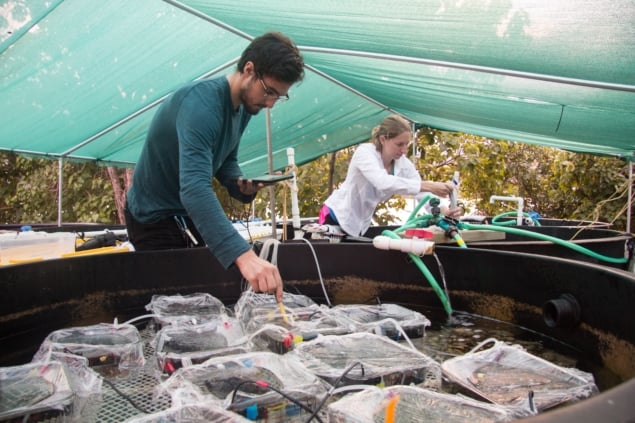
Nutrient pollution from man-made sources such as sanitation and agriculture threatens a variety of habitats around the world. Now US researchers have shown that nutrient pollution can make corals more vulnerable to global ocean acidification.
Coral reefs survive as long as they grow faster than erosion wears them away. Organisms that build the reef, like corals, are calcifiers; they lay down calcium carbonate they have gathered from the water to build their skeletons. Other organisms break down the reef structure physically, while it will also dissolve if the seawater becomes slightly acidic. One cause of ocean acidification is increased atmospheric carbon dioxide levels emitted by humans, a problem projected to worsen in the future.
To investigate how increased nutrient levels affect coral reefs, Nyssa Silbiger of California State University, US, and colleagues added nitrates and phosphates – common components of fertiliser – to aquaria containing coral, algae such as seaweeds, and organisms living in coral-free rubble and sand, all important components of reef communities. They measured activities critical to the healthy functioning of a reef – calcification, dissolution, respiration and photosynthesis – and combined the results to achieve a picture of the whole community.
When nutrient levels were high, both photosynthesis and respiration rates increased across the community, including in the coral’s symbiotic algae. But calcification by corals reduced. This may be because both calcification and photosynthesis compete for dissolved inorganic carbon. The corals, however, also became less able to use carbonate dissolved in seawater, their raw material for calcification. An increase in dissolved carbonate usually means more calcification but under elevated nutrient conditions this relationship collapsed; calcifying organisms did not lay down as much more, or, in some cases, any, carbonate under higher dissolved carbonate levels. Acidified seawater shrinks the reef in these conditions; it dissolves faster than the corals can build it.
Occasionally, the elevated nutrient levels used in this study have occurred naturally in the Pacific. They are set to become more widespread if pollution in the seas continues to increase. Nutrient run-off could become a serious problem in marine communities as human developments spread along coastlines, increasing the coastal population and the amount of waste it produces. These new results lay bare the threat such pollution causes to already beleaguered coral reef ecosystems, potentially tipping them from net growth into decline.
Silbiger and colleagues from the University of Hawai’i at Mānoa, University of Rhode Island and the University of California, San Diego published their findings in Proceedings of the Royal Society B.



